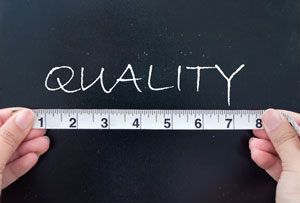Beware of Misleading Career Tests

Most career tests on the internet are likely to misinform you about your personality strengths and recommend careers that do not fit you – adversely affecting your school, college or career success.
Here are two that are widely used,
Interest Profiler (1999). If your dominant Holland personality type is Enterprising and you take the O*Net Interest Profiler, there is a good chance it will wrongly tell you that your dominant personality is Artistic — a very different personality (IP User's Guide, pg. 43).
It misleads you into thinking you are something you are not and, then, matches you with Artistic occupations that don't fit you.
It is what professionals call an "invalid" measure.
The Interest Profiler (IP) is widely used by state and federal agencies and schools. Companies package it in their online career and college guidance products they license to schools, colleges, and libraries (sometimes giving it a different name).
Another form of the IP, the Interest Profiler Short Form, was published in 2010 that the authors say overcomes the problems of the IP Long Form.
Unfortunately, there are no studies published in scientific journals regarding the long or short form of the IP test. When this is done, you know there has been a "blind," peer review by experts in the field. This is expected for any respected test. It's common sense. You want to say, "Yes," with confidence to the question, "Does this test truly measure the Holland personality types?"
Career Clusters Interest Survey. The CCIS is widely promoted by states, the federal government, and companies to assess students' interests and guide them in choosing one of the U.S. Department of Education's 16 Career Clusters (and Pathways).
The only scientific study investigating its validity showed that it does it not measure interests in the Data/Idea area — four of the six Holland personality types: Enterprising, Conventional, Artistic, and Investigative. (Prime & Tracey, 2010).
Pseudo-career tests like these go by a variety of names, like — sorter, finder, quiz, survey, zone, path, and color. Unsupported claims about their validity are frequently made.
If you or your child has taken a career test over the past 15 years, there is a good chance you have been told that your interests are something they are not, and directed toward careers or college majors that do not fit your personality.
All of this is really unfortunate because valid career tests can help you be successful in school, college, and your career.
Tips for Choosing a Good Career Test
- Check to see if there is an online professional manual, like The Career Key that cites studies in scientific journals. That is a good sign.
- If you or your child is in a school that subscribes to an online educational or career guidance system, ask the principal or school counselor if the there are published studies in scientific journals that support the validity of the career measure it uses.
- Be wary of endorsements by professional organizations or links from their web pages. Unfortunately, they are often unreliable.
- Use a valid measure. Besides The Career Key, the following are valid measures of Holland's interests/personality types: Vocational Preference Inventory, Self-Directed Search, Strong Interest Inventory, Campbell Interest and Skills Survey, and ACT's UNIACT.
- Keep in mind that no test can tell you what to do. But, they can help you:
- Learn about yourself,
- Identify promising careers, training programs, or college majors and,
- Make a good decision.
- Seek the help of a professionally trained career counselor who recognizes the importance of test validity.
More...
- Valid career measures can help you make good choices about school, college, and your career.
Studies of college students over the past ten years show that with a good personality-major match you are likely to,- Earn higher grades,
- Stick with your choice of major through graduation,
- Graduate on time, and
- Be more satisfied and successful in your career.
- A recent ACT college choice report shows that only 1 out of 3 high school graduating students are planning on college majors that are a good fit with their interests. This puts the remaining 2/3 at risk.
- Some in the counseling field advise using "informal assessments" like the CCIS "just for exploration"; that it is good way to stimulate career exploration; validity is a not an issue. Questionable advice.
Studies show that,- Students' Holland RIASEC interests in the 8th through 12 grade show a high degree of stablity (Tracey, Robbins & Hofsess, 2005), so middle school students are ready to start serious exploration, and the,
- Decisions they make at this age will affect their future school and career success.
- Valid career measures require years of scientific study. The results are reported in scientific, journals. Before being approved for publication, they are reviewed anonymously and independently by scientists in the field. This takes time and money.
- For greater depth, read Caution: Internet-Based Assessments May be Hazardous to Your Career, published by the National Career Development Association, and Personality-College Major Match and Student Success. A Guide for Professionals Helping Youth and Adults Who are in College or are College-Bound.


